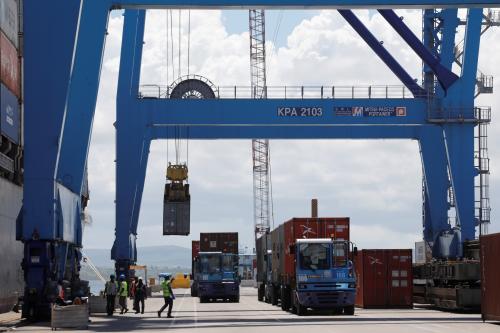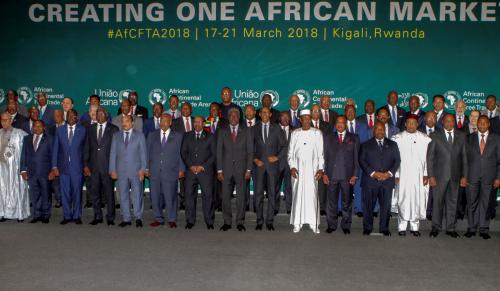Africa’s extreme vulnerability to the disruption of international supply chains during the COVID-19 pandemic highlights the need to reduce the continent’s dependence on non-African trading partners and unlock Africa’s business potential. While African countries are right to focus their energy on managing the immediate health crisis, they must not lose sight of finalizing the Africa Continental Free Trade Agreement (AfCFTA), which can be a tool to help them do just that.
Africa’s economy is highly dependent on international markets—for both its imports and exports. Given that an estimated 53 percent of African imports originate in countries that have been highly impacted by COVID-19, the pandemic is interrupting the region’s access to critical products. With two-thirds of African countries being net importers of food and medicine, global trade restrictions and cross-border blockages risk creating shortages and increasing the cost of items essential to mitigate the immediate effects of the pandemic. At the same time, global supply chain disruptions are expected to result in export earnings losses of $101 billion, with an estimated $65 billion for oil-producing countries and massive hits in other export sectors, such as the garment and cut-flower industries. Similarly, the pandemic has seriously disrupted key services industries on the continent, including tourism, transport, and logistics services.
The operational launch of the AfCFTA—originally scheduled for July 2020—is now postponed. The next round of negotiations, scheduled for May 30, will likely not happen before November or December. Wamkele Mene, the newly elected secretary-general of the AfCFTA Secretariat, has noted that remote negotiations were impossible, due not only to connectivity problems, but also the need to translate everything into the continent’s four official languages. (These schedule changes are pending ratification by the member states.)
Even without the pandemic, however, the AfCFTA’s launch agenda was ambitious, with key elements of the AfCFTA, such as rules of origin, tariff reductions, and services schedules, yet to be finalized; implementation challenges (e.g., Nigeria’s border closures in response to smuggling); and challenges created by bilateral trade deals with non-African countries potentially undermining the broader integration agenda.
As the AfCFTA’s launch has been postponed, the Secretariat—together with the African Union’s trade commissioner and member governments—has directed its efforts at two different objectives: 1) continuing the flow of trade as much as possible, especially of essential products, and 2) starting longer-term planning about how the AfCFTA can help Africa be more resilient in the face of future crises. Had the AfCFTA already been operational when the pandemic hit, leaders would have been more empowered and would have had more tools to address both of these objectives.
The AfCFTA will improve access to products essential to respond to COVID-19
“Trade corridors” or “green lanes” expedite and ensure the free flow of essential commodities and are essential to mitigate the impact of the pandemic. The AfCFTA contains annexes on trade facilitation, customs cooperation, and transit that, if implemented, would require State Parties countries to put in place infrastructure to facilitate cross-border trade, on the basis of which trade corridors could easily be established. Furthermore, the AfCFTA envisions the establishment of a Sub-Committee on Trade Facilitation, Customs Cooperation and Transit, which would be able to oversee implementation and facilitate coordination of customs processes, including for expedient delivery of essential products across the continent—tasks sorely needed right now.
In a summit of the African Union Bureau of Heads of State and Government, African governments “underscored the need for a comprehensive and coordinated continental approach and to speak with one voice of Africa’s priorities,” yet trade-related measures taken by African countries in response to COVID-19 seem anything but coordinated. So far, some countries have lifted tariffs on products essential for controlling the pandemic while others have not. From those African countries that have lifted import tariffs, they vary in their scope of application—ranging from face masks and hand sanitizers to personal protective equipment, medical supply products, and certain food products. Similarly, key African economies, including South Africa, Kenya, and Côte d’Ivoire, continue to impose temporary export restrictions on essential supplies.
The AfCFTA, which includes various tools for enforcing trade provisions, would empower leaders in their coordination of trade across the region—for example, by serving as a platform by which leaders can establish guidelines on what types of products are deemed “essential” for tariff liberalization and by providing a continent-wide timeline for the COVID-19 import liberalization measures.
Moreover, under the AfCFTA, State Parties agreed to liberalize tariffs for 90 percent of their tariff lines on goods, with longer transition times for an additional 7 percent of tariff lines on sensitive goods. As the tariff negotiations are yet to be finalized, State Parties could use this opportunity to include, where appropriate, “essential products” in their tariff schedules.
Removing export bans and other quantity restrictions on essential products would require diplomatic pressure from the AfCFTA Secretariat. While under the AfCFTA, State Parties agreed to refrain from imposing quantity restrictions, but the agreement contains exceptions enabling State Parties to do so under a number of different circumstances—provided that certain parameters are met. Doing so prevents unjustified protectionism.
The principle of transparency—establishing the requirement that members publish and promulgate measures that relate to trade matters—features prominently in the AfCFTA and will also aid leaders in coordinating and collaborating on a continent-wide response to this COVID-19 pandemic or a future health crisis.
The AfCFTA will render Africa more resilient to respond to future public health crises
The pandemic has also underscored the importance for Africa to build resilience and reduce its reliance on international supply chains for critical products and services.
Notably, the South African government has already issued a tender for the domestic production of ventilators, while in Kenya, the government has announced that the textile industry will be manufacturing face masks and personal protective equipment (PPE). In Nigeria, the military has begun mass production of ventilators and PPE kits. The AfCFTA, which is predicted to strengthen regional value chains, would be able to scale up and render more competitive local manufacturing of essential medical equipment currently in short supply in Africa.
Adopting a regional approach to developing these value chains would enable State Parties to use their comparative advantages, attract investment in the necessary infrastructure, and create economies of scale. It would also ensure that State Parties without the capacity to produce these products would be able to access them from within the region. The AfCFTA could accelerate these regional value chains through prioritization and coordination, and throughliberalizing key inputs and service sectors essential to manufacturing critical medical equipment in addition to transport and telecommunications.
The first round of the AfCFTA services negotiations will include the transport, tourism, and communications sectors. Increased liberalization of these sectors across Africa is expected to render them more competitive and to increase much-needed investment over the long run. Together with the Protocol on the Free Movement of People, this can be expected to boost intra-African tourism, which will help the hard-hit sector recover once the pandemic is over. Notably, health services are currently excluded from the first round of services negotiations, and State Parties should consider adding it to the priority list.
The pandemic has also highlighted the importance of digitalization for accelerating intra-African trade. As noted above, the inability ofthe AfCFTA to continue remote negotiations is directly related to poor broadband connectivity on the continent. Moreover, e-commerce is proving critical for businesses to continue to operate and for consumers to access essential goods and services. Creating a thriving environment for e-commerce and e-transactions requires investment in a well-functioning telecommunications infrastructure, in addition to regulatory frameworks that create the enabling environment for e-commerce. This highlights not only the importance of negotiations in telecommunications services, but also the critical importance of pursuing negotiations in Phase III on e-commerce.
In order to experience the benefits of the AfCFTA, State Parties that have not ratified the AfCFTA must make it a priority to do so, and overall complete the negotiations and accelerate the implementation of AfCFTA. While they must finalize Phase I, it is particularly important they make progress on Phase II of the negotiations—which will include protocols on investment, competition, and intellectual property. Doing so would make Africa more attractive to investments and innovations—especially in areas critical for fighting pandemics, such as medical facilities and supplies and pharmaceutical products crucial toto strengthening the public health sector and securing access to medicine.
As noted by Mene, Africa should see this crisis as an opportunity. And, indeed, it is an opportunity to strengthen intra-African supply chains, enhance resilience, and improve Africa’s infrastructure and health systems. It is also an opportunity for the AfCFTA: The especially dire impact the pandemic is predicted to have on Africa is the best argument yet for the urgency and importance of the AfCFTA to unlocking Africa’s potential.
The Brookings Institution is committed to quality, independence, and impact.
We are supported by a diverse array of funders. In line with our values and policies, each Brookings publication represents the sole views of its author(s).









Commentary
How the AfCFTA will improve access to ‘essential products’ and bolster Africa’s resilience to respond to future pandemics
April 30, 2020